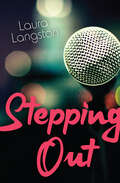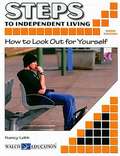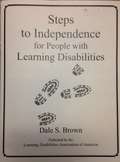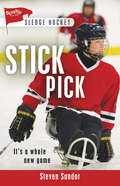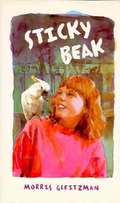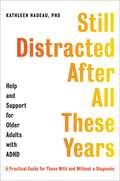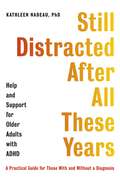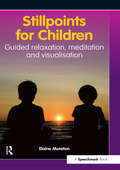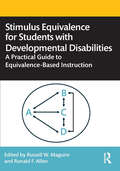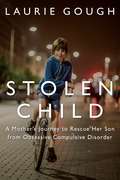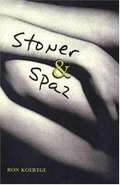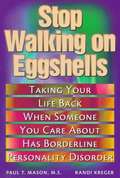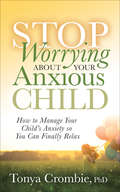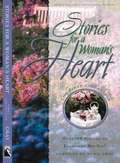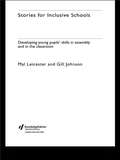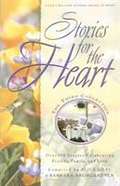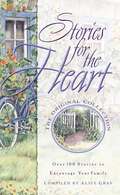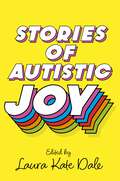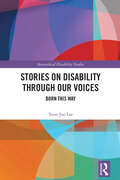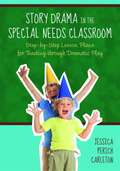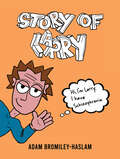- Table View
- List View
Stepping Out (Orca Limelights)
by Laura LangstonLaughter is fifteen-year-old Paige Larsson’s currency in life. It takes the sting out of life’s tough stuff. It eases the pain of nasty comments, agonizing moments in gym class and awkward pauses at parties. Paige likes it even more when others laugh with her, so she’s become a YouTube comedy vlogger. Now Paige is about to step out of her comfort zone and compete—live and onstage—in the prestigious International Teens in Comedy festival. Winning will give her the opportunity to work with some of the biggest names in comedy. It’ll also mean $10,000 for her school’s performing-arts department. But Paige has always used her humor to mask the pain of a disability, and in the world of stand-up comedy, that won’t cut it anymore. This short novel is a high-interest, low-reading level book for middle-grade readers who are building reading skills, want a quick read or say they don’t like to read! The epub edition of this title is fully accessible.
Steps To Independent Living: How To Look Out For Yourself
by Nancy LobbCompletely updated, part of the best-selling series that shows students how to take care of themselves and face the challenges of everyday living. Explains essential tasks and responsibilities at a manageable reading level, with demonstrations, activities, illustrations, self-tests and comprehension checks throughout the text. "How to Look Out for Yourself " focuses on staying emotionally healthy, keeping personally safe, and making wise decisions about alcohol, drugs, tobacco, and sexual activity.
Steps to Independence for People with Learning Disabilities
by Dale S. BrownThe booklet is designed to help learning disabled (LD) adults become economically independent and fulfill their potential. Introductory chapters define LD and specify such types of LD as auditory perceptual problems, catastrophic responses, directional problems, disinhibition, perceptual problems, and short term memory problems. Psychological effects of never being diagnosed are noted as well as potential dangers of being labeled. Suggestions for securing a professional diagnosis and for diagnosing one's self are given. Parents are encouraged to find practical solutions to family life problems and to teach independent living skills. Vocational aspects are examined, including searching for a job, choosing the right one, and being proud of one's job. Ideas are listed for analyzing strengths and weaknesses to overcome one's own handicap. The importance of social skills training is stressed. Practical coping strategies for dealing with perceptual problems (visual perception, dyslexia, and auditory perception) and central nervous system disorganization (directionality, hyperactivity, disinhibition, catastrophic response, and perseveration) are addressed. A final chapter lists sources of further information, professional help, and self help groups.
Steve and the Guide Dogs
by Alberta ArmerFrom the Book jacket: Steve's spirits soared when the Guide Dog School promised him he could raise a puppy. Now that his favorite uncle, Jason, had left home, he felt lonely--and besides, all the pets on the family's dairy farm belonged to Grandma Morley. At last Mr. Dempster, the 4-H leader brought him a beautiful German shepherd puppy especially bred to be a Guide Dog someday for a blind person. Steve loved teaching this important job to his puppy. And he didn't mind at all doing extra farm chores or delivering eggs to pay for the dog's expenses, for he longed to have the pride of finally graduating a full-fledged guide dog. But all did not go smoothly, and Steve had to learn some bitter lessons in heartbreak and in perseverance before he was able to face his failure and find the courage to begin again. Every page of this heartwarming story is illuminated by the author's deep insight into the world of a young boy, as well as by her knowledge of guide-dog training and her love of the majestic redwood country she knows so well. J. C. Kocsis has illustrated this inspiring, moving book with handsome line drawings.
Steven the Snail: Targeting s Blends (Speech Bubbles 1)
by Melissa PalmerSteven is having a birthday party, but it’s a long journey to the party. Will me make it in time, and in one piece? This picture book targets /s/ blends, and is part of Speech Bubbles 1, a series of picture books that target specific speech sounds within the story. The series can be used for children receiving speech therapy, for children who have a speech sound delay/disorder, or simply as an activity for children’s speech sound development and/or phonological awareness. They are ideal for use by parents, teachers or caregivers. Bright pictures and a fun story create an engaging activity perfect for sound awareness. Please see other titles in the series for stories targeting other speech sounds.
Stick Pick (Lorimer Sports Stories)
by Steven SandorStar player Janine leads her hockey team to victory at the provincial championships. But on the way home from the game, a car accident leaves her paralyzed from the waist down. Her best friend and teammate, Rowena, urges Janine to look into sledge hockey. Adapting to her new life, Janine meets frustration at every turn. Soon Janine begins to appreciate her new sport. Her experiences lead her to speak up about rights for the disabled, taking her cause all the way to the professional sports arena. She might be a sledge hockey rookie, but she knows she's up for any challenge. Based on real-life experience and research, this story tracks the emotional and physical challenges of first dealing with disability. Distributed in the U.S by Lerner Publishing Group.
Sticky Beak
by Morris GleitzmanWhen Rowena, who is mute, rescues a pet cockatoo from the class bully, she begins to make sense of her feelings about the new baby her father and stepmother are expecting.
Still Distracted After All These Years: Help and Support for Older Adults with ADHD
by Kathleen G. NadeauOne of the foremost ADHD experts tackles adult cases in the aging generation and offers a practical, helpful guide for those with and without a diagnosis Do you… Forget to pay bills Live in a disorganized environment Struggle with depression and anxiety Procrastinate on projects, even ones that initially excite you Have high levels of conflict with those close to you Have a child diagnosed with ADHD and/or a family history of learning disorders If some of these patterns sound familiar, you may have undiagnosed ADHD. ADHD in adults is one of the most common disorders. Living with ADHD in our later years is hugely influenced by multiple factors: co-occurring issues, such as anxiety, depression, low self-esteem, and learning disorders combined with a heightened level of stress, the presence or lack of support from others, and the number of people we are responsible for, can complicate and intensify the effects of ADHD. The good news is that you&’ve come to the right place to learn more about how older adults with ADHD can lead calmer, happier, more productive lives. Dr. Kathleen Nadeau, a foremost authority on ADHD, has been working with this underserved and underrepresented population. Dedicated to the health and wellbeing of today&’s older adults with ADHD, Still Distracted After All These Years offers strategies to build a support system, gain better control over your daily life and create a more ADHD-friendly retirement.
Still Distracted After All These Years: Help and Support for Older Adults with ADHD
by Kathleen NadeauThe world's foremost expert shares advice on later-in-life ADHD, tackling everything from finances, parenting, planning for retirement, social life and work, in this practical and helpful guide for those with and without a diagnosis.Do you...· Forget to pay bills?· Live in a disorganised environment?· Struggle with mental health?· Procrastinate on projects, even ones that initially excite you?· Have high levels of conflict with those close to you?· Have a child diagnosed with ADHD and/or a family history of learning disorders?If some of these patterns sound familiar, you might understandably fear the onset of dementia, but you may have undiagnosed attention deficit hyperactivity disorder (ADHD). ADHD in adults is one of the most common disorders. Living with ADHD in our later years is hugely influenced by co-occurring issues, such as anxiety, depression or low self-esteem. In addition, the presence of learning disorders, heightened levels of stress, the presence or lack of support from others, and the number of people we are responsible for, can all complicate and intensify the effects of ADHD.The good news is that you've come to the right place to learn more about how to lead a calmer, happier, more productive life. Dedicated to the health and wellbeing of today's older adults with ADHD, Still Distracted After All These Years offers strategies to build a support system, gain better control over your daily life and create a more ADHD-friendly retirement.
Stillpoints for Children: Guided Relaxation, Meditation and Visualisation
by Elaine MoretonResearch shows that the stress points in children's daily lives are on the increase and can have a negative impact on their ability to learn, relate to others and to themselves. This practical resource: explains and demystifies relaxation, meditation and visualisation; provides an educational rationale backed up by case study material that shows the benefits of helping children to develop 'stillpoints' in order to neutralise stress, develop a stronger sense of 'self' and create 'optimum' learning states; includes a very practical and unique resource for use in the classroom or home. Based on sound educational, yogic and psychological philosophies, each of the 7 tracks has a specific theme and is only 5 minutes long: Track 1: Relaxation - 5/6 minutes (sitting in a chair); Track 2: Heart Meditation - 5/6 minutes (sitting in a chair); Track 3: Finding Peacefulness - 5/6 minutes (sitting in a chair); Track 4: Pack Up Your Troubles - 5/6 minutes (sitting in a chair); Track 5: Finding Silence - 5/6 minutes (sitting in a chair); Track 6: The Learning Tree - 5/6 minutes (sitting cross-legged); Track 7: The Learning Tree 2 - 5/6 minutes (lying down). The handbook provides the rationale for the 'why' and the CD provides the guidance and practical application on the 'how'.
Stimulus Equivalence for Students with Developmental Disabilities: A Practical Guide to Equivalence-Based Instruction
by Russell W. Maguire Ronald F. AllenStimulus Equivalence for Students with Developmental Disabilities provides a step-by-step program for converting lesson plans into equivalence-based instruction. Using language and tools accessible to both students and practitioners, chapters present the concept of equivalence-based instruction and include clear and concise procedural descriptions, as well as data sheets and PowerPoint slides, with replaceable stimuli, so that special educators and clinicians will be able to immediately implement this procedure to teach any academic skill. Written in engaging prose with an emphasis on practical application, this book is an essential resource for special educators and graduate students studying to become BCBAs and special educators.
Stolen Child: A Mother's Journey to Rescue Her Son From Obsessive Compulsive Disorder
by Laurie GoughA year in the desperate life of a boy transformed by OCD from a bright ten-year-old into a stranger in his own skin. Although Laurie Gough was an intrepid traveller who had explored wild, far-off reaches of the globe, the journey she and her family took in their own home in their small Quebec village proved to be far more frightening, strange, and foreign than any land she had ever visited. It began when Gough's son, shattered by his grandfather's death, transformed from a bright, soccer-ball kicking ten-year-old into a near-stranger, falling into trances where his parents couldn't reach him and performing ever-changing rituals of magical thinking designed to bring his grandpa back to life. Stolen Child examines a horrifying year in one family's life, the lengths the parents went to to help their son, and how they won the battle against his all-consuming disorder.
Stolen Pony
by Glen Rounds(from the book jacket): Stolen! Locked in a swaying truck, the little blind pony snorts with terror. Horse thieves captured him in the dead of night. And now he is being carried farther and farther from home. What will happen when the thieves find out he is blind? Will they turn him loose? But how can a blind pony find his way home?
Stoner and Spaz
by Ron KoertgeFOR SIXTEEN-YEAR-OLD BEN BANCROFT a kid with cerebral palsy, no parents, and an overprotective grandmother, happiness is, watching Bride of Frankenstein for the umpteenth time.
Stop Walking on Eggshells: Taking Your Life Back When Someone You Care about Has Borderline Personality Disorder
by Paul T. Mason Randi KregerPeople with Borderline Personality Disorder (BPD) challenge those close to them with their often bewildering mood shifts and unpredictable behavior. For those people who have relationships with persons with BPD, whether they be relatives, friends, spouses, parents, or children, this book should prove a godsend. It delineates the ways in which borderline individuals' (BPs) behavior and communications frustrate and perplex those around them but goes further in articulating specific strategies that those close to the person with Borderline Personality Disorder (non-BPs, as they are termed in this book) can effectively cope with these kinds of behaviors.
Stop Worrying About Your Anxious Child: How to Manage Your Child's Anxiety so You Can Finally Relax
by Tonya CrombieA life coach guides parents through techniques that help you easily manage your child’s anxiety.Are you afraid your child’s anxiety may be more of an issue than you thought? Are you doing everything you can think of to help your anxious child but still feel like you’re failing? Does it feel as if everyone else is so busy judging and giving advice that they can’t love your child just the way your child is? Are you afraid your child won’t have a best friend or even a close group of friends? Do you simply hope your child will learn to cope with anxiety and have a happy, successful life?You can stop worrying!In Stop Worrying About Your Anxious Child, you learn how to manage your child’s anxiety so you can relax, enjoy parenthood, and begin to trust in your child’s bright future again.Dr. Tonya Crombie teaches the techniques that she uses to help herself and parents just like you, including how to:Deal with judgment from well-meaning friends and othersSift through all of the advice and determine what will work for your childStay calm even when the stress is especially toughCreate a support system that supports you and your childYour child deserves a bright future—learn how to start managing your child’s anxiety today!
Stop the World I Want to Get Off: A guide to understanding and supporting the recovery of autistic burnout in children and young people
by Jodie ClarkeWith mental health crisis in autistic young people on the rise we need to accept that Living as an autistic person in a world that doesn't cater to your needs is exhausting at best and harmful at worst.Autistic burnout is a common experience for autistic children and young people. This book, authored by a neurodivergent practitioner with firsthand experience as both an autism parent and researcher, delves into the recognition and management of burnout. It offers parents and professionals practical strategies to prevent autistic burnout and provides guidance on supporting those already in distress.For every child that has been forced into school in pyjamas, for every parent blamed for their child's non-attendance, for every professional who wants to learn more and for every young person traumatized by those who thought they knew best-this book is for you.
Stories For a Woman's Heart: Over One Hundred Treasures to Touch Your Soul (Stories For the Heart #1)
by Alice GrayBack Cover: "Find a quiet corner and snuggle up with this enchanting collection of stories that celebrates the wondrous ways of women. These are timeless treasures selected to inspire your thoughts and stir your soul. Revel in laughter and friendship. Cherish special moments that reach across generations. And be encouraged by tender stories of compassion that are sure to tug at your heart." In this collection, Alice Gray has compiled over 100 stories that provide inspiration and encouragement. Some of the stories have characters with disabilities while other stories do not. Many of the contributing writers to this collection are Christian and provide a Christian perspective on life. The stories cover a variety of topics such as mothers, relationships, faith, and virtue.
Stories for Inclusive Schools: Developing Young Pupils' Skills
by Mal Leicester Gill JohnsonThis gem is the ideal companion for the busy primary school teacher. Packed with timesaving resources for both the classroom and assembly, it provides a wealth of activities to develop key values and skills in your pupils. Using the power of stories, the authors champion a fresh and inspiring approach to inclusive education across the curriculum, integrating key values into classroom learning. The twelve themed tales stimulate reflection and discussion on such sensitive areas as: bullying prejudice physical disability as well as 'hidden' disabilities alternative lifestyles, cultures, and different appearances parental difference. Lively characters of various ethnic origins, who embody respect for diversity, enhance these multicultural stories. In addition, each session contributes to key skills learning in English, including speaking and listening, reflecting, reasoning and concentrating. Many of the activities also integrate coordination and art and craft skills, numeracy and science skills. The many photocopiable activity pages make this an essential tool for teachers or heads who wish to ensure that inclusion is genuinely working for all children throughout their school.
Stories for the Heart the Third Collection: Over 100 Stories Celabrating Friends, Family, and Love (Stories for the Heart)
by Alice Gray Barbara BaumgardnerIn this collection, Alice Gray and Barbara Baumgardner compiled over 100 selections that provide understanding and compassion. These entries comprise stories, poetry, vignettes, and sayings. Some of the entries have characters with disabilities, while other selections do not. Many of the contributing writers to this collection are Christian and provide a Christian perspective on life. The compilers placed the selections under these categories: Encouragement, Love, Inspiration, Family, Memories, Life, and Faith. The final section, Because We Care, is an evangelistic one designed to lead readers to God.
Stories for the Heart: Over 100 Stories to Encourage Your Soul (Stories for the Heart #1)
by Alice GrayIn this original collection, Alice Gray, author and compiler, assembled over 100 selections that provide inspiration and encouragement. These selections comprise stories, poetry, and sayings. Some of the entries have characters with disabilities. Many of the contributing writers to this collection are Christian and provide a Christian perspective on life. The selections cover a variety of topics such as compassion, relationships, faith, and virtue. The last section is evangelistic and is designed to help readers find God.
Stories of Autistic Joy
by Laura Kate Dale'I love that I don't need to feel ashamed at my happiest, and that my joy no longer needs to go through a filter before it's ready to see the light of day'Laura Kate Dale and 15 other autistic authors from around the globe, open the door and invite you in to explore and celebrate the candid, uplifting and intimate moments of autistic joy. More often than not autism is viewed through the lens of struggles and challenges - Stories of Autistic Joy is here to shift that narrative and turn the spotlight onto the unique joys that shape autistic people's lives.Joy comes in all shapes and sizes: loving relationships, fantasy writing, building soft forts, echolalia, peaceful solitude, Pokemon, stimming freely and unmasking for the first time. So, step inside and explore the diverse and heart-warming stories from around the world and celebrate what makes experiencing autistic joy so special.
Stories on Disability Through our Voices: Born This Way (Autocritical Disability Studies)
by Yoon Joo LeeThis book integrates the discipline of disability studies with the lived experiences of women with visible disabilities. It seeks to foreground the silenced voices of Korean and Korean American women with visible physical disabilities in South Korea and the United States. Drawing upon the work of scholars in disability studies, largely drawn from in disability studies in education and feminist disability studies, it challenges readers to (re)consider their own misconceptions and assumptions about disability and reconceptualize their understanding of diversity. A special distinction of this book is that the author, as a woman with visible disabilities, can connect to other women with visible disabilities in unique ways as they share similar experiences as well as their own unique stories through the process of in-depth interviews. Starting with a recollection of her own experience of living with a disability, it then moves to the lived experiences of four other women with disabilities. This unique way of storytelling conveys the important message that living with disability is not a one-time linear process from initial diagnosis to acceptance and overcoming, but a dynamic, evolving, and ongoing meaning-making journey. It will be of interest to all scholars and students of disability studies, Asian studies, women’s studies, and sociology more broadly.
Story of Larry
by Adam Bromiley-HaslamBeneath the veneer of simplicity lies a profound exploration of the mind’s deepest quandaries. Journey with me through relentless internal battles, where the only opponent is oneself. Confront the pervasive dread of solitude and the challenges of discerning reality from illusion. If these pages resonate with even a single reader, every struggle shared will have been worth the journey. Discover a narrative that seeks connection in our shared human experience.
